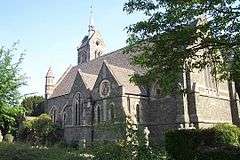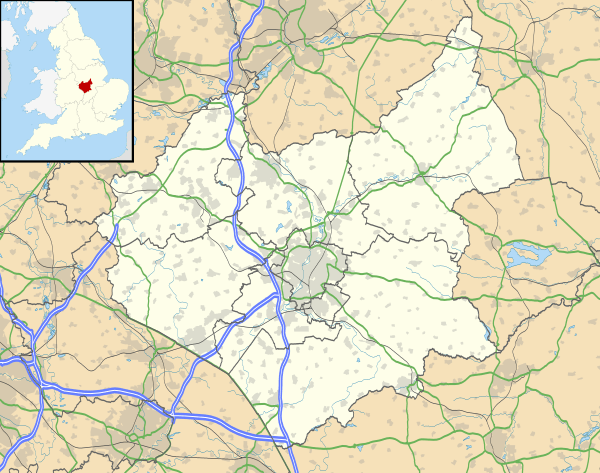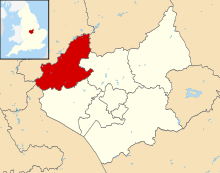Bardon, Leicestershire
Bardon is a civil parish and former village in North West Leicestershire about 1.5 miles (2.4 km) southeast of the centre of Coalville.[2] The parish includes Bardon Hill, which at 912 feet (278 m) above sea level is the highest point in Leicestershire. With the population remaining less than 100, information from the 2011 census was included in the civil parish of Ellistown and Battleflat.
| Bardon | |
|---|---|
 St. Peter's parish church | |
 Bardon Location within Leicestershire | |
| Population | 26 (2001 Census)[1] |
| OS grid reference | SK4412 |
| Civil parish |
|
| District | |
| Shire county | |
| Region | |
| Country | England |
| Sovereign state | United Kingdom |
| Post town | Coalville |
| Postcode district | LE67 |
| Dialling code | 01530 |
| Police | Leicestershire |
| Fire | Leicestershire |
| Ambulance | East Midlands |
| UK Parliament | |
History
East of Bardon Hill is an oval moat about 12 metres (39 ft) wide and 1.5 metres (5 ft) deep.[3] It encloses an area measuring about 65 metres (213 ft) by 75 metres (246 ft), and the island thus created is raised about 1.5 metres (5 ft) above the level of the surrounding land.[3] The site is a scheduled monument.[3] This site is about 440 metres (1,440 ft) east of Kellam's Farm and a few metres north of the main east-west asphalt driveway (carriage road) linking Copt Oak and Bardon Hall.
South of Bardon Hill is a second moat. This moat is square or rectangular. The moat island is the site of the old Bardon Hall, which was demolished in about 1840 after the current Bardon Hall was completed further up Bardon Hill.[4] The latter is a Tudor revival house designed by the architect Robert Lugar[5] and completed in about 1837.[4]
Granite was being quarried from Bardon Hill by 1622.[6] In 1832 the Leicester and Swannington Railway was opened, passing close by the then village of Bardon. A branch was built to the quarry and continues to carry granite from the quarry to this day. Bardon Hill railway station was near the parish church. The station was closed in the 20th century but the railway through it remains open for freight as part of the Leicester to Burton upon Trent Line.
In 1921 Bardon had a population of 511[7] and a public house called the Birch Tree.[8] However, in the 1990s the village was demolished to allow the quarry to be expanded.[7]
Bardon Hall
Bardon Hall is a mid-19th century Tudor revival house built in about 1830[9] or 1837. It was designed by the architect Robert Lugar for Robert Jacomb Hood.[9][10] An earlier moated house, the Old Hall, was situated in a shallow valley in Bardon Park, south of Bardon Hill. The hall had been the property of members of the Hood family since the 1620s. The last male member of this family, William Hood, died in 1835 without issue. Hood left the estate to his cousin, Robert Jacomb, on condition that Robert assumed the surname of Hood.
The Old Hall was demolished in about 1840 for Robert Jacomb Hood, who described it in his memoirs as "too dilapidated for residence, and the situation was low, damp and unhealthy"[11] The moat that surrounded it still remains.
In 1864 the whole estate was sold to William Percy Herrick of Beaumanor Hall. To improve access Herrick had a 2 miles (3 km) private carriage road built, leading to the Ashby de la Zouch road.[12]
The Hall is Grade II listed,[9] and is the head office of Aggregate Industries, the owners of Bardon Hill Quarry.
Church and chapel
Parish church
The Church of England parish church of Saint Peter was designed by the architect J.B. Everard[5] (1844–1923)[13] and built in 1899.[5] St. Peter's was built in memory of two members of the Everard family[14] who were co-owners of the quarry, and the architect also is buried in the churchyard. The church is built of granite, and its exterior masonry is not coursed but laid like crazy paving.[5]
The tower has a saddleback roof topped by a flèche.[5] It has three bells, all cast by John Taylor & Co of Loughborough in 1899.[15]
St. Peter's parish is now part of a single benefice with Christ Church, Coalville and St. Michael and All Angels, Ravenstone.[14] Bardon's ecclesiastical and civil parishes are not coterminous. St. Peter's church is about 330 yards (300 m) outside the civil parish, in the civil parish of Coalville.
Chapel
Bardon Park Chapel[16] is a 17th-century nonconformist chapel in the southernmost part of the parish, close to the main A511 road (formerly the A50) between M1 Junction 22 and Coalville. The chapel was built in about 1694 and altered in about 1830, 1877 and about 1900.[17] A number of original 17th-century features survive, including the roof trusses and the wooden pulpit, which is octagonal and has fluted Doric pilasters.[17] A wooden screen and doors date from the remodelling of about 1830.[17] The chapel has always been galleried, but the original gallery which had wooden Doric columns was replaced in the remodelling of about 1900 with the present gallery on iron columns.[17] The chapel is part of the United Reformed Church.[17]
See also
References
- "Area selected: North West Leicestershire (Non-Metropolitan District)". Neighbourhood Statistics: Full Dataset View. Office for National Statistics. Archived from the original on 24 September 2012. Retrieved 19 July 2011.
- "History of Bardon in North West Leicestershire | Map and description". www.visionofbritain.org.uk. Retrieved 16 May 2017.
- Historic England. "Moated site 440m east of Kellam's Farm (1012527)". National Heritage List for England. Retrieved 21 July 2011.
- "History of Ownership of Bardon Park". Bardon Park Chapel. Retrieved 21 July 2011.
- Pevsner 1960, p. 57
- "1858–1918 An introduction part 1". Bardon Hill Quarries. Aggregate Industries. 2011. Retrieved 19 July 2011.
- "Bardon Oral History". Leicester Villages. Leicestershire Rural Partnership. Retrieved 19 July 2011.
- "Bardon Village". Leicester Villages. Leicestershire Rural Partnership. Retrieved 19 July 2011.
- Historic England (31 October 1983). "Bardon Hall (1361238)". National Heritage List for England. Retrieved 2 January 2013.
- Pevsner, Nikolaus (1960). Leicestershire and Rutland. The Buildings of England. Harmondsworth: Penguin Books. p. 57.
- Noble 1995, p. 17.
- Nuttall 1907, p. 188.
- Brodie et al. 2001, p. 735.
- Archbishops' Council (2010). "Bardon Hill: St Peter, Bardon Hill". A Church Near You. Church of England. Retrieved 19 July 2011.
- Dawson, George (8 October 2010). "Bardon S Peter". Dove's Guide for Church Bell Ringers. Central Council of Church Bell Ringers. Retrieved 19 July 2011.
- Bardon Park Chapel
- Historic England. "Bardon Park Chapel (1271908)". National Heritage List for England. Retrieved 21 July 2011.
Sources and further reading
- Brodie, Antonia; Felstead, Alison; Franklin, Jonathan; Pinfield, Leslie, eds. (2001). Directory of British Architects 1834–1914. A–K. London & New York: Continuum. p. 735. ISBN 0-8264-5513-1.CS1 maint: ref=harv (link)
- Hartley, R.F. (1984). The Medieval Earthworks of North West Leicestershire. pp. 8–9.CS1 maint: ref=harv (link)
- Noble, Len (1995). Bardon Hill – a source book being a collection of papers, anecdotes and published work concerning the ancient enclosure of Bardon Park, with additional comment. self-published. ISBN 0-9525978-0-2.CS1 maint: ref=harv (link)
- Nuttall, G. Clarke (1907). A Guide to Leicester and District. Leicester: Edward Shardlow. p. 188.CS1 maint: ref=harv (link)
- Pevsner, Nikolaus (1960). Leicestershire and Rutland. The Buildings of England. Harmondsworth: Penguin Books. p. 57.CS1 maint: ref=harv (link)
External links
![]()
